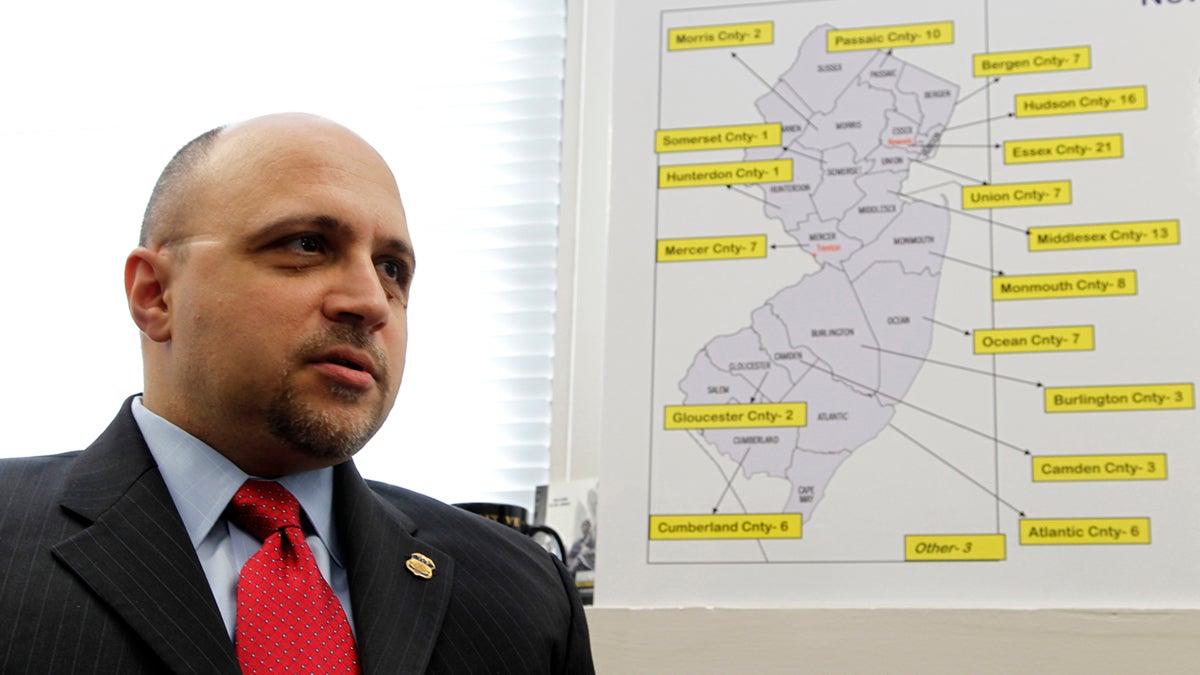N.J. ICE director: “Most of the country’s behind us”

John Tsoukaris, director of the Newark field office for the U.S. Immigration and Customs Enforcement, talks about the arrests of 123 illegal immigrants in New Jersey during operation Cross Check III during an interview with The Associated Press, Monday, April 2, 2012, in Newark, N.J. The Obama administration said it arrested more than 3,100 immigrants who were illegally in the country and who were convicted of serious crimes or otherwise considered fugitives or threats to national security. It was part of a six-day nationwide sweep that the government described as the largest of its kind. (Julio Cortez/AP Photo)
“Life, unauthorized” is a series from WHYY/NewsWorks that looks at the personal immigration stories of individuals who are living in the Philadelphia region without legal status.
Immigration enforcement has taken a dramatic upswing in the United States.
The most recent numbers from the US Department of Homeland Security show that immigration arrests have increased by more than 30 percent in 2017, over this time last year. Many have criminal records, although a growing number of those arrested do not.
President Donald Trump has also called for hiring 10,000 more immigration officers, to focus on deporting unauthorized immigrants from the interior of the country as well as near its borders.
These policy changes, as well as unverified reports of “sweeps” or “raids” by ICE officers have stoked fear across immigrant communities. Much of that fear is directed at the men and women charged with enforcing United State’s immigration law – ICE officers.
WHYY reporter Laura Benshoff spoke with New Jersey ICE field office director John Tsoukaris to discuss these changes and hear the law enforcement perspective on viral reports of immigration “raids.”
This interview transcript has been condensed and edited for clarity.
Q: What do you see as the biggest change in how the US is enforcing immigration laws under President Donald Trump?
A: In the prior administration, we had three priorities defined. They were the public safety threats — in terms of people with felony convictions, gang membership, the second priority was multiple misdemeanor convictions, and the third was anyone ordered deported after January 2014.
Under the new directive, the new executive order, there are no specific priorities. So, basically, there are no individuals exempt from the enforcement of immigration laws. We still prioritize the public safety threats, however any removable alien that we encounter is subject to arrest.
Q: In the immigration conversation, there’s a lot of focus on borders. But, New Jersey, where you cover, isn’t anywhere near the US Southern border. Can you give me a rundown of what a day in the life of an ICE agent that works for you looks like?
A: All the individuals that we are seeking, we know who they are, and we’re targeting them specifically. Once someone is arrested, we bring them back to the office, they get processed, fingerprints are taken, and they’re issued a charging document which tells them what the immigration charges are and they generally go to court before an immigration judge. Once that process is over, our officers coordinate with the foreign embassies to issue a passport or travel document in order to affect the individual’s removal from the United States.
Q: I want to ask how “sanctuary city” policies affect your work. We have quite a few in this region and the mayors of sanctuary cities say they’re happy to hand over people when ICE provides a warrant. Could you explain why, from ICE’s point-of-view, it’s helpful that those detainer requests be honored?
A: I understand there are some cities that designate the themselves as “sanctuary cities.” If we know there’s an individual that we’re looking for in that city, we will arrest that individual in that city. Counties that do not honor the immigration retainer, I believe, put their citizens or community members at risk, because they are releasing individuals with very serious crimes, rather than turn them over for arrest and processing ultimately. [Ed. note: ICE detainers may be for those charged with crimes, not only those convicted.]
Q: Covering immigration for WHYY, I do often get a response [from ICE] that contradicts the versions of events that eyewitnesses or local attorneys say ICE agents have taken. “Yes, this was targeted” versus “They had no warrants it wasn’t targeted.” Why might there be two different versions of “reality” when it comes to what actually happens during an immigration arrest?
A: Like I said, our operations are targeted. There are sometimes media reports, and we get media questions [asking] if we were at a bus station, or if we were in a certain church or mosque or some public area, and later it turns out it was like a police department that was doing some type of enforcement action. And they mistook those people for ICE. So there’s a lot of things that are reported that may not be 100 percent accurate, but all of our actions are going after specific individuals. They’re not just go out in the street and whoever you can find.
Q: What is it like to be a person who wears the ICE uniform and enforces immigration laws in a time when there are these critical headlines about the work that you do. Drawing attention to things like people being arrested as they go to immigration court or people that being arrested as they go to immigration court, or people being picked up in places we weren’t seeing it before.
A: I know you mentioned the court arrests, usually they’re done for higher level crimes and usually they’re done in situations where we have not been able to locate that individual elsewhere. That’s a very difficult question. ICE agents and officers, we’re here to enforce the laws the the United States. Sometimes, I believe we get criticized unfairly because we have to follow the law. We’re an executive branch agency and what we tell our officers is that they’re doing the job they’re hired to do, they’re enforcing the laws, and I believe most of the country’s behind us.
WHYY is your source for fact-based, in-depth journalism and information. As a nonprofit organization, we rely on financial support from readers like you. Please give today.




